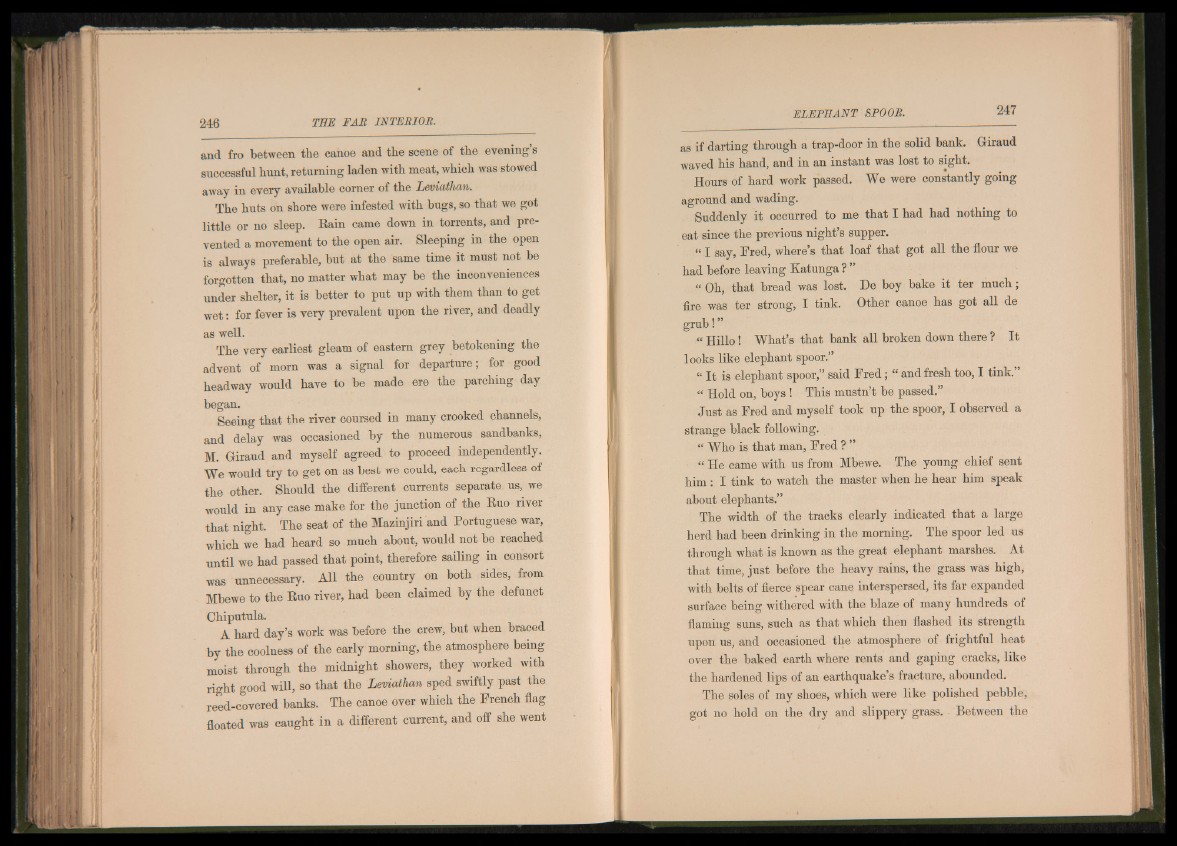
and fro between tbe canoe and tbe scene of the evening’s
successful bunt, returning laden witb meat, which was stowed
away in every available corner of the Leviathan.
The huts on shore were infested with bugs, so that we got
little or no sleep. Bain came down in torrents, and prevented
a movement to the open air. Sleeping in the open
is always preferable, but at the same time it must not be
forgotten that, no matter what may be the inconveniences
under shelter, it is better to put up with them than to get
wet: for fever is very prevalent upon the river, and deadly
as well.
The very earliest gleam of eastern grey betokening the
advent of morn was a signal for departure; for good
headway would have to be made ere the parching day
began.
Seeing that the river coursed in many crooked channels,
and delay was occasioned by the numerous sandbanks,
M. Giraud and myself agreed to proceed independently.
We would try to get on as best we could, each regardless of
the other. Should the different currents separate us, we
would in any case make for the junction of the Buo river
that night. The seat of the Mazinjiri and Portuguese war,
which we had heard so much about, would not be reached
until we had passed that point, therefore sailing in consort
was unnecessary. All the country on both sides, from
Mbewe to the Buo river, had been claimed by the defunct
Chiputula.
A hard day’s work was before the crew, but when braced
by the coolness of the early morning, the atmosphere being
moist through the midnight showers, they worked with
right good will, so that the Leviathan sped swiftly past the
reed-covered b a n k s . The canoe over which the French flag
floated was caught in a different current, and off she went
as if darting through a trap-door in the solid bank. Giraud
waved his hand, and in an instant was lost to sight.
Hours of hard work passed. We were constantly going
aground and wading.
Suddenly it occurred to me that I had had nothing to
eat since the previous night’s supper.
“ I say, Fred, where’s that loaf that got all the flour we
had before leaving Katunga ? ”
“ Oh, that bread was lost. He boy bake it ter much;
fire was ter strong, I tink. Other canoe has got all de
grub! ”
“ H illo! What’s that bank all broken down there ? I t
looks like elephant spoor.”
“ I t is elephant spoor,” said F re d ; “ and fresh too, I tink.”
“ Hold on, boys ! This mustn’t be passed.”
Just as Fred and myself took up the spoor, I observed a
strange black following.
“ Who is that man, Fred ? ”
“ He came with us from Mbewe. The young chief sent
h im : I tink to watch the master when he hear him speak
about elephants.”
The width of the tracks clearly indicated that a large
herd had been drinking in the morning. The spoor led us
through what is known as the great elephant marshes. At
that time, just before the heavy rains, the grass was high,
with belts of fierce spear cane interspersed, its far expanded
surface being withered with the blaze of many hundreds of
flaming suns, such as that which then flashed its strength
upon us, and occasioned the atmosphere of frightful heat
over the baked earth where rents and gaping cracks, like
the hardened lips of an earthquake’s fracture, abounded.
The soles of my shoes, which were like polished pebble,
got no hold on the dry and slippery grass. Between the